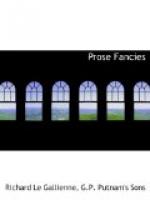But, though it may pay for a while, it will, I am sure, prove a disastrous policy in the long run. The poet unborn shall, I am certain, rue it. The next generation of poets (or, indeed, writers generally) will reap a sorrowful harvest from the gratuitous disillusionment with which the present generation is so eager to indulge the curiosity, and flatter the mediocrity, of the public. The public, like the big baby it is, is continually crying ‘to see the wheels go round,’ and for a time the exhibition of, so to say, the ‘works’ of poet and novelist is profitable. But a time will come when, with its curiosity sated, the public will turn upon the poet, and throw into his face, on his own authority, that he is but as they are, that his airs of inspiration and divine right are humbug. And in that day the poet will block his silk hat, will shave away the silken moustache, will get him a bottle of Mrs. Allen’s Hair Restorer, and betake himself to the sombrero of his ancestors—but it will be all too late. The cat will have been irrecoverably let out of the bag, the mystery of the poet as exploded as the mysteries of Eleusis.
Tennyson knew better. To use the word in its mediaevalsense, he respected the ‘mystery’ of poetry. Instinctively, doubtless, but also, I should imagine, deliberately, he all his life lived up to the traditional type of the poet, and kept between him and his public a proper veil of Sinaitic mist. You remember Browning’s picture of the mysterious poet ’you saw go up and down Valladolid,’ and the awestruck rumours that were whispered about him—how, for instance—
’If you tracked him
to his home, down lanes
Beyond the Jewry, and as clean
to pace,
You found he ate his supper
in a room
Blazing with lights, four
Titians on the wall,
And twenty naked girls to
change his plate!’
That is the kind of thing the public likes to hear of its poets. That is something like a poet. Inquisitive the public always will be, but it is a mistake to indulge rather than to pique its curiosity. Tennyson respected the wishes of his public in this matter, and, not only in his dress and his dramatic seclusion, but surely in his obstinate avoidance of prose-work of any kind we have a subtler expression of his carefulness for fame. It is a mistake for a poet to write prose, however good, for it is a charming illusion of the public that, comparatively speaking, any one can write prose. It is an earthly accomplishment, it is as walking is to flying—is it not stigmatised ‘pedestrian’? Now, your true Bird of Paradise, which is the poet, must, metaphorically speaking, have no legs—as Adrian Harley said was the case with the women in Richard Feverel’s poems. He must never be seen to walk in prose, for his part is, ‘pinnacled dim in the intense inane,’ to hang aloft and warble the unpremeditated lay, without erasure or blot. This is, I am sure, not fanciful, for two or three modern instances, which I am far too considerate to




